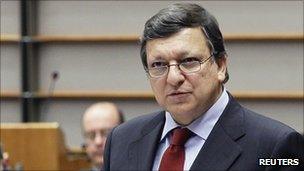Barroso promises proper bank health checks
- Published
- comments

Mr Barroso called for greater 'firepower' for the eurozone bailout fund
The president of the European Commission has confirmed an intention to negotiate a bolder solution to the eurozone's financial crisis over the coming fortnight.
Jose Manuel Barroso's three main pillars of such a rescue are, however, much as anticipated.
There would be what he called a "decisive solution" to Greece's inability to repay its public sector debts - which implies that there will be a writedown of Greek government debt greater than the 21% currently agreed.
But he has also reiterated, which may seem naive to some of the EU's creditors, that no other eurozone member would be permitted to reduce the value of what they owe.
There would be greater "firepower" for the EU's bailout fund, the European Financial Stability Facility (EFSF), than its planned 440bn euros - although it is not clear how this firepower would be acquired.
And there should be a strengthening of banks - based on tests of how much the banks would lose if a number of eurozone member states with excessive debts are unable to repay all they owe.
Mr Barroso explained why he now accepts the time for half-measures has passed.
He said: "For confidence to return, we need to fix the sovereign debt problem, which can only be done through a coherent package. And we must therefore urgently strengthen the banks, because in fact, those two issues - the sovereign contagion and the banks - are now, whether we like it or not, linked".
Bold enough?
Probably the most important statement he made was that the amount of capital that will have to be injected into banks will be determined by potential losses banks would incur on their loans to governments, irrespective of whether the loans are held in so-called trading books or banking books.
This may seem technical. But it would correct one of the glaring flaws of previous European health checks or stress tests on banks.
That said, it is impossible to gauge whether the eventual solution will be bold enough to reassure banks' creditors and investors - because Mr Barroso refused to say what precise level of potential loss on loans to the likes of Greece, Portugal, the Republic of Ireland, Italy and Spain the banks should protect themselves against.
It is also unclear how much the "stressed" minimum ratio of capital to assets will be increased, to reassure lenders to banks that the banks are strong enough to weather almost any storm.
A European Commission paper published today to accompany Mr Barroso's statement - called "a roadmap to stability and growth" - talks of the imposition of a "temporary, significantly higher capital ratio of highest quality capital after accounting for exposure [to the debt of weaker eurozone countries]".
For what it's worth, if the minimum after-stress ratio were set at 7%, well over 50 eurozone banks would collectively have to raise not far off 200bn euros ($276bn; £175bn) of additional capital - and banks in Germany, Italy, Greece, Spain and France would be most in need of propping up.
Setting the bar 1% higher or lower would make a world of difference to how much eurozone taxpayers would have to fork out to save the eurozone banking system, and would also determine whether the burden of the rescue would fall mainly on national governments or on the collective EFSF bailout fund (and if the EFSF does take the strain, it's Germany that would be the main underwriter of the rescue).